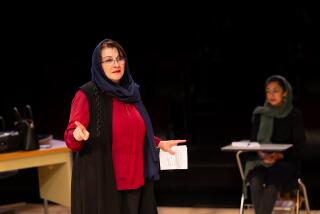Today’s Hollywood is speaking in tongues
- Share via
In the 1942 Humphrey Bogart-Ingrid Bergman classic “Casablanca,” a veritable mini-United Nations of men and women gather at Rick’s to drink, to scheme, to gamble and to fall in and out of love, all under the watchful gaze of French and German authorities. But what is rare in that movie is to find characters speaking at length in their native tongues.
Today’s directors have a different attitude toward the use of foreign languages. Today, if the characters speak a language other than English, so be it. What used to be strictly limited to foreign films -- the lowly subtitle -- increasingly turns up in mainstream Hollywood films.
In “The Missing,” for example, director Ron Howard gambled that the audience would go along with the use of subtitles in several scenes with exchanges that take place in the difficult language of the Chiricahua Apache. All the movies in the “Lord of the Rings” trilogy feature scenes in which elves converse in “elvish” with English subtitles.
Now comes DreamWorks’ powerful drama “House of Sand and Fog,” opening Friday, in which Ben Kingsley and Shohreh Aghdashloo play husband-and-wife Iranian immigrants who, with their teenage son (Jonathan Ahdout), buy a bungalow in Northern California only to find themselves in a test of wills with the former owner, played by Jennifer Connelly.
Throughout the film, Russian-born first-time director Vadim Perelman lends authenticity to the story by having actors speak Farsi, the language of Iran, and running subtitles at the bottom of the screen. But not all the time.
Perelman said he used subtitles, for example, when the wife, Nadi, is speaking at length or yelling at her husband about buying the house. “I did not want to interrupt,” Perelman explained. But at other times, he dispenses with the subtitles and sprinkles Nadi’s dialogue with English and Farsi so the audience will stay focused on the actors and the action.
“When she spoke to him, she would say the words ‘You dirty, kaseef liar!’ ” Perelman said. “The purpose of that is so it can flow. So the eye doesn’t jump to the bottom of the screen. She essentially puts the subtitle into her dialogue, and it feels authentic.”
Hollywood doesn’t have to pander anymore, Perelman said, because American society is much more multicultural and people are more tolerant of foreign tongues.
“We go down the street to a 7-11 and we hear six different languages,” the director said. “Americans in the 1940s wouldn’t like that.”
-- Robert W. Welkos
More to Read
Only good movies
Get the Indie Focus newsletter, Mark Olsen's weekly guide to the world of cinema.
You may occasionally receive promotional content from the Los Angeles Times.










